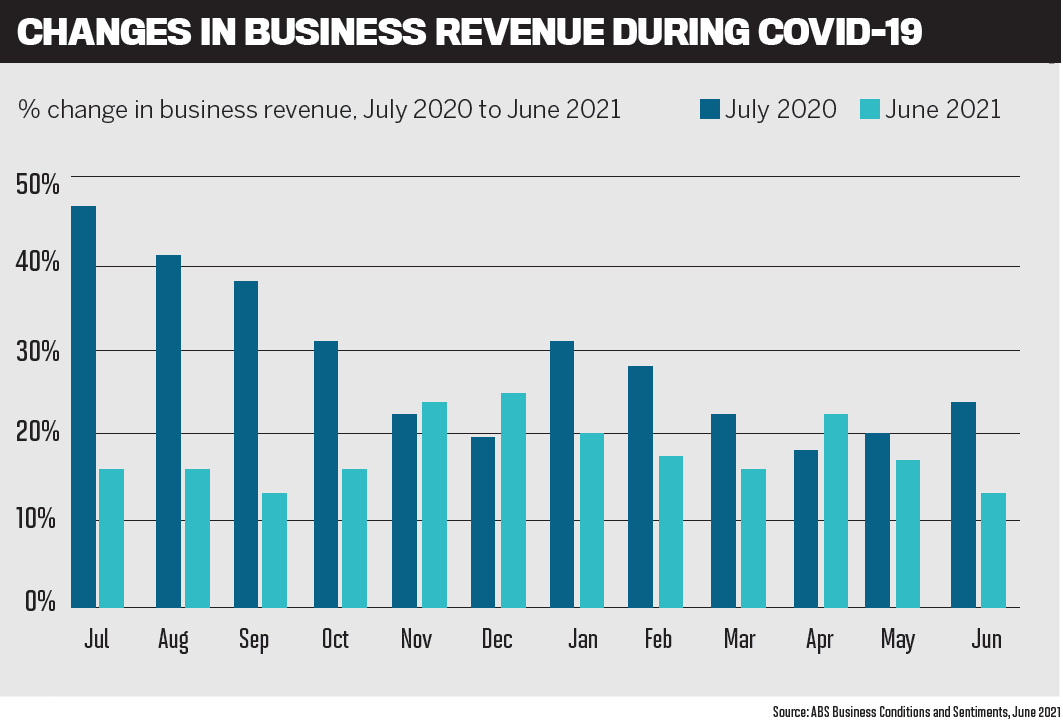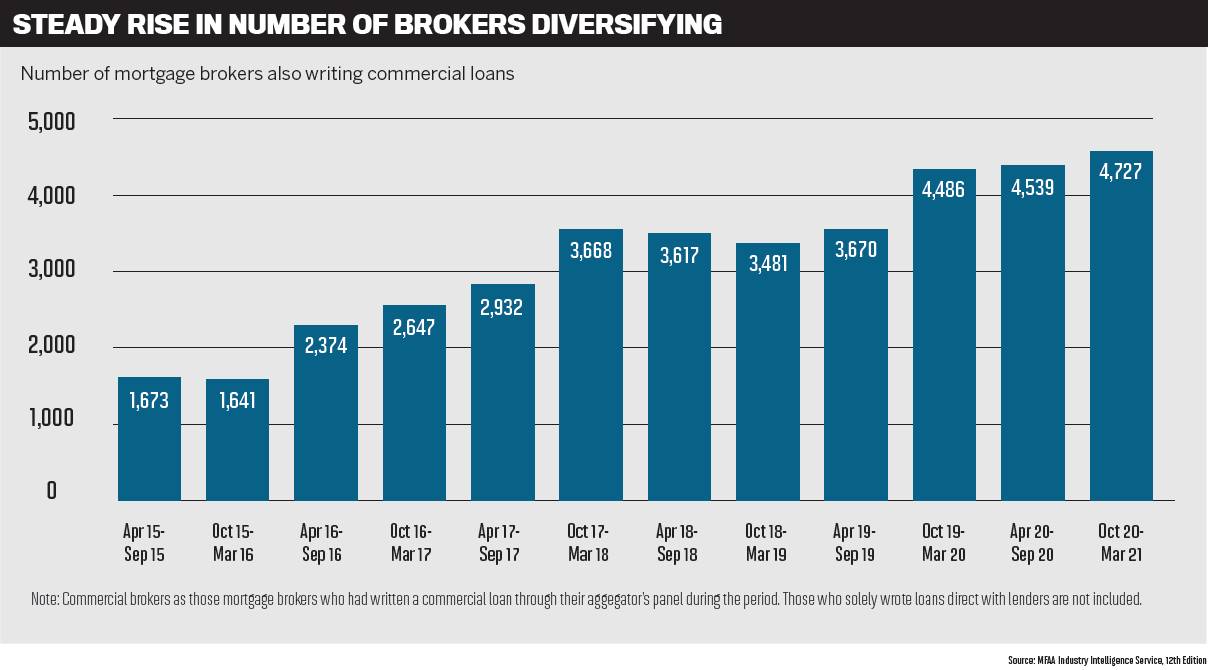With changing regulations and the peaks and troughs of the loan market, brokers can protect their revenue stream by diversifying their lending solutions

“Any time is a good time for brokers to think about diversifying. The thing about COVID is it’s given brokers the opportunity to build closer relationships with their small business customers,” says John Kolyvas, ING’s national sales manager, commercial.
Throughout the pandemic, mortgage brokers have been on the frontline with borrowers needing additional support with home loans. Many of these clients would also have been small business owners looking for help with commercial finance as restrictions impacted the running of their businesses.
Kolyvas says the support provided during this period would have created long-term relationships, as brokers were taking the time to understand their clients’ businesses. Now, as businesses open up and plan how to continue to grow again, brokers are positioned to help them seek working capital.
As business owners themselves, mortgage brokers should be looking at diversification as a way of creating business stability and reducing risk, Kolyvas says.
“Most brokers have a large base of self-employed customers that they have arranged home loans for. By not taking an interest in how that customer is funding their business, and just focusing on the home loan, you’re really placing the relationship with that customer at risk, as someone else – be that another broker or the bank – will take an interest, and they will take an interest in the whole relationship as well,” he says.
If your self-employed home loan customers already trust you, Kolyvas says you could offer to also undertake a review of their business banking.
Asset finance is a great place to start for mortgage brokers who have not delved into commercial lending before. Even if it’s a simple car loan, Kolyvas says that will begin to reposition the broker’s business in the eyes of the client.
It’s also important for brokers to build their knowledge: speak to their BDMs, attend lender training sessions, and speak to other brokers who have already diversified.
To ease mortgage brokers into the world of commercial lending, ING has tried to make its small business loan application process as similar as possible to a home loan application for a self-employed client. Its credit assist team also take a “hands-on approach” to helping the broker structure the loan and application.
But Kolyvas says the broker should not try to take on anything too complex too early on.
“If a large, complex application lands on your lap and you’re overwhelmed, my suggestion would probably be to partner up with a commercial specialist broker that you know and trust, and make sure you use it as an opportunity to get a bit of training as well,” he says.
Brokers can help businesses recover
Mortgage brokers who have diversified and used ScotPac to offer SME loans have said diversifying was a great way to stand out from their competitors. ScotPac CEO Jon Sutton believes there are many opportunities for brokers to diversify, both now and in the future. Brokers will be needed to help businesses secure funding for growth and merger or acquisition opportunities as the economy opens up, and to assist them with cash flow challenges and business restructuring.
“Whether COVID hit hard (like in retail, hospitality, tourism) or fast-tracked growth (as in transport), businesses need fast funding like never before, and this creates opportunities for brokers,” Sutton says.
“Brokers can play a key role by doing their bit to help Australian businesses recover.”
ScotPac recently announced its $100m SME Bounce Back Fund to help businesses through the recovery process. It is completely removing the interest cost for the first three months for clients using the fund. Business owners will be able to get fast access to additional working capital of up to $1m, while brokers retain their normal commissions.
The lender has also just introduced a new mortgage product for business owners and a property-secured business loan, “so the opportunities for brokers with us in the SME lending space are enormous”, Sutton says.
On top of offers like these and its broad range of products, ScotPac prides itself on not having a “cookie-cutter approach”.
“The benefit of working with the established market leader in non-bank business lending is that we understand the business environment better, so we can say yes where other lenders can’t, and we find a way to put together a solution to meet the exact needs of each business,” Sutton says.
ScotPac regularly releases its SME Growth Index. Its latest data showed that eight in 10 SMEs had cash flow issues in 2021 and two in three businesses tried new funding sources, with non-bank offerings such as invoice finance becoming increasingly popular.
Sutton says its research shows that the current business environment off ers brokers a great opportunity to become the trusted adviser every small business needs; there has been a fourfold increase in SMEs turning to trusted advisers rather than “going it alone”.
“Brokers have a crucial role in helping business owners access funding,” he says.
“Now is the time for brokers to have conversations with their small business clients about funding that can help a business manage its cash flow.”

Diversifying broker revenue steams
SME lender OnDeck saw a 175% jump in broker-originated SME finance between January and June 2021 compared to the same period in 2020.
One reason behind the lift in volume is that many SMEs were pivoting into new markets and delivery channels and investing in new equipment ahead of the economy reopening.
Nick Reily, national channel and partner-ships manager at OnDeck, anticipates that the number of broker-originated loans in this sector will keep rising as restrictions lift during the festive season.
“Just as growing numbers of consumers now turn to a mortgage broker for their home loan, OnDeck has seen a significant uptick in demand for small business loans via the broker channel,” he says.
“This trend confirms that small businesses are looking to a trusted adviser for support in their financing journey. It’s great for small businesses, and it’s giving more brokers an opportunity to diversify their revenue base through commercial lending.”
To support SMEs in 2021, OnDeck launched its Lightning Loans product and KOALA Score™ credit-scoring model. Small businesses were able to take advantage of fast access to finance and short-term opportunities such as early payment discounts on trading stock. a holistic service, becoming a “one-stop shop” for their customers’ personal and business lending needs.
“Diversifying into small business lending benefits brokers in several ways,” he says.
“A broker’s business is likely to be one of their most valuable investments – and all investments benefit from diversification. It means that if the home loan market cools, brokers can maintain a robust revenue stream through commercial lending.
“Diversifying helps to protect a broker’s business from regulatory change that may impact their core business – often home loan lending. We saw in early October the changes APRA made to lenders’ buff er rates, and this has the potential to impact the home loan market. By diversifying into small business lending, brokers can protect their revenue base.”
Adding that brokers are often surprised to discover how quick and easy small business lending can be, Reily says OnDeck’s speed and simplicity give brokers and their clients a “very different experience” from traditional commercial lending through the mainstream banks.
As a fintech lender, OnDeck can help brokers who are new to SME lending, offering a “high-tech/high-touch” ethos and working closely with brokers to ensure a seamless experience. It also provides free online tools like Know Your Score, which helps businesses understand their credit scores.
“Trying anything for the first time can be challenging and confronting,” says Reily. “But brokers have no reason to feel nervous writing small business loans with OnDeck.”




